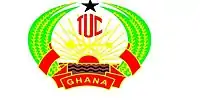Ghana Trades Union Congress
The Ghana Trades Union Congress is a national centre that unites various workers' organizations in Ghana.[1][2] The organization was established in 1945.[2]
 | |
| Founded | 1945 |
|---|---|
| Members | 500,000 |
| Affiliation | ITUC |
| Office location | Accra, Ghana |
| Country | Ghana |
| Website | ghanatuc |
History
The GTUC as a central co-ordinating body for 14 union groups in 1945.[2] The unions were registered under the Trade Union Ordinance of 1941. In 1954, the union proposed that the local unions be amalgamated along industrial groupings to make the union strong. The proposal was approved in 1955.[2] The union had 24 member unions in 1958 and was regulated by the Industrial Relations Act 56.[2] The first elections of the GTUC was held in 1966 after Kwame Nkrumah, the first president of Ghana was overthrown. The election was conducted to replace the union leaders who were under detention under the National Liberation Council. In 1971, the GTUC was dissolved as the sole trades union congress after parliament, led by the Busia government, passed Act 383. The Act was repealed by the I.K. Acheampong government in the same year. The union's executives were replaced in a "coup d'etat" in 1983 by an Interim Management Committee at the instance of the Association of Local Unions (ALU) of the Greater Accra Region.[2] The union in 1984 held it national congress to restore it existence and restored its constitutionality.
Membership
The membership of the organization is made up of all workers' group. A local union is formed by any five members at a work place. Various local groups which share common objectives form a national group - a local group. The local union upon formally registering with the TUC is admitted as a member of the group.[3]
Functions
The union's functions include:[4]
- protecting the collective bargaining rights of member unions under it
- advocacy and policy intervention concerning labour market and national issues that concerns its members.
Organization strength
In 2007, the member strength of the union was about 350,000 members.[4]
In 2004, the following unions were affiliated:[5]
| Union | Abbreviation | Membership (2001) |
|---|---|---|
| Communications Workers' Union | CWU | |
| Construction and Building Materials Workers' Union | CBMWU | |
| General Agricultural Workers' Union | GAWU | 14,710 |
| General Transport, Petroleum and Chemical Workers' Union | GTPCWU | |
| Ghana Mine Workers' Union | GMWU | |
| Ghana Private Road Transport Union | GPRTU | 26,901 |
| Health Services Workers' Union | HSWU | 16,647 |
| Industrial and Commercial Workers' Union | ICU | 42,070 |
| Local Government Workers' Union | LGWU | |
| Maritime and Dock Workers' Union | MDU | |
| National Union of Seamen | NUS | |
| Public Services Workers' Union | PSWU | 27,084 |
| Public Utility Workers' Union | PUWU | 17,111 |
| Railway Workers' Union | RWU | |
| Railway Enginemen's Union | REU | |
| Teachers and Educational Workers' Union | TEWU | 30,246 |
| Timber and Woodworkers' Union | TWU | 22,758 |
International affiliations
The GTUC is affiliated with various international trade union organizations, including the Organisation of Trade Unions of West Africa (OTUWA).[4]
References
- "GTUC". www.ghanatuc.org. Retrieved 8 June 2011.
- "Landmarks". www.ghanatuc.org. Archived from the original on 18 January 2011. Retrieved 9 June 2011.
- "Who can be a member". www.ghanatuc.org. Archived from the original on 18 January 2011. Retrieved 9 June 2011.
- "About the GTUC". www.ghanatuc.org. Archived from the original on 26 July 2011. Retrieved 9 June 2011.
- "The Case of Ghana" (PDF). Friedrich Ebert Stiftung. February 2004. Retrieved 20 October 2019.